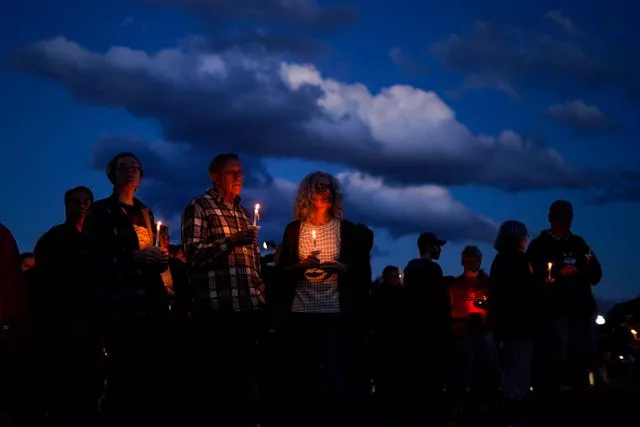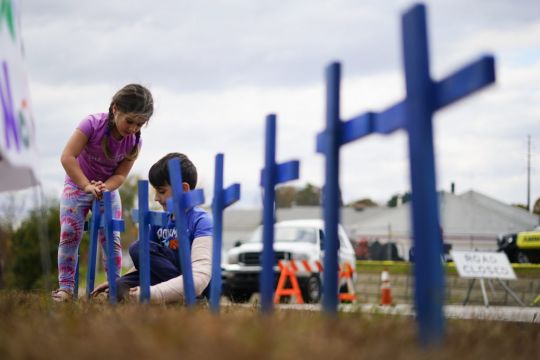Police missed two clear opportunities to end a search that locked down and terrified Maine’s second largest city after a gunman killed 18 people at a bowling alley and a bar following a recent spiral into paranoia.
The body of Robert Card was found on Friday in a trailer at a recycling centre in Lisbon Falls that police had searched a day earlier.
He died of an apparent self-inflicted gunshot wound, but it was unclear when, authorities said.
The 40-year-old was suspected of also injuring 13 people during the shooting rampage on Wednesday night in Lewiston.
Lisbon police chief Ryan McGee said law enforcement scoured the Maine Recycling property, where Card once worked, and cleared it on Thursday, but did not check another part of the company’s land nearby. Officers came back early on Friday morning and again found nothing.

Another team returned that evening and searched the other part of the property that had not been checked, and found Card’s body in the trailer along with two firearms, Mr McGee said.
A rifle had been found on Wednesday night in Card’s abandoned car nearby.
Authorities recovered a multitude of weapons during their search for Card and believe he had legally purchased his guns, including those recovered in his car and near his body, said Jim Ferguson, the special agent in charge of the Boston office of the Bureau of Alcohol, Tobacco, Firearms and Explosives.
He declined to provide specific details about the guns, including their make and model, and would not say exactly how many were found.
Investigators are still searching for a motive for the massacre, but have increasingly been focused on Card’s mental health history.
State Department of Public Safety Commissioner Michael Sauschuck said Card was hearing voices and had paranoia, adding that he believed “people were talking about him and there may even have been some voices at play”.
Last summer, Card underwent a mental health evaluation after he began acting erratically at an Army training facility in New York, officials said. A bulletin sent to police shortly after this week’s attack said Card had been committed to a mental health facility for two weeks after “hearing voices and threats to shoot up” a military base.

At a news conference on Saturday, Mr Sauschuck said there was no evidence that Card had ever been involuntarily committed to a mental health facility, which could have made it illegal for him to possess guns. A simple evaluation or voluntary commitment would not have triggered such a prohibition, he said.
Under Maine’s yellow flag law, law enforcement can detain someone they suspect is mentally ill and poses a threat to themselves or others. The law differs from red flag laws in that it requires police first to get a medical practitioner to evaluate the person and find them to be a threat before police can petition a judge to order the seizure of the person’s firearms.
“Just because there appears to be a mental health nexus to this scenario, the vast majority of people with mental health diagnosis will never hurt anybody,” Mr Sauschuck said.
Police found a note in Card’s home addressed to a loved one with the passcode to his phone and bank account number, Mr Sauschuck said. The commissioner said he would not describe it as an explicit suicide note but the tone indicated that was the intent.
Family members of Card told federal investigators he had recently discussed hearing voices and became more focused on the bowling alley and bar, according to law enforcement officials.
Street life returned to Lewiston on Saturday after a days-long lockdown in the city of 37,000. Joggers took advantage of the warm weather. People walked their dogs, picked up coffee and visited other shops that had been closed since the shooting.

For many residents it was a day to reflect, mourn and, for some, take the first tentative steps towards normalcy.
William Brackett, whose namesake son was among those killed, visited the memorial on Saturday and said he could feel pent up tension leave his body when he learned Card was dead.
“I’m telling you, if I had a bottle of champagne, I would’ve popped it and celebrated,” he said.
In Lisbon Falls, not far from where Card’s body was found, about 150 people gathered for an evening vigil at a grassy field. They lit candles, and a volunteer group walked trauma therapy dogs around.
Jonathan Jones, pastor of Lisbon Falls Baptist Church, read a prayer and thanked police. He then recited the first names of the 18 people killed in the shooting.
The deadliest shootings in Maine history stunned a state of 1.3 million people that has relatively little violent crime and had only 29 killings in all of 2022.
Three patients remained in critical condition at Central Maine Medical Centre, and a fourth was stable, hospital officials said. Another patient was transported to Massachusetts General Hospital, and the rest were discharged.
The Lewiston shootings were the 36th mass killing in the United States this year, according to a database.







